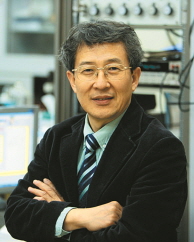
Park Jin-ho (PHYS, Ph.D. Candidate) in the laboratory of Professor Lee Hu-jong (PHYS) and Professor Lee Gil-ho (PHYS), succeeded in realizing the short ballistic Josephson coupling in planar graphene junctions for the first time, with Dr. Lee Jae-hyeong (Samsung Advanced Institute of Technology), Hiroshima University, Japan and Korea Institute of Materials Science. With this research, it became able to come to a step closer to realizing a stable quantum device requiring strong coherence.
A superconductor is a material in which current flows under a certain temperature, called critical temperature, without electrical resistance. The current flowing without electric resistance is called a super current. Interestingly, even if two superconducting electrodes are spaced apart by a short conductor having length of several hundred nanometers, a super current can flow between the two electrodes, and this structure is called a Josephson junction.
The research was published in the current edition of the Physical Review Letter, a prominent academic journal of American Physical Society, and was supported by Advanced Research Center Program of National Research Foundation of Korea.


